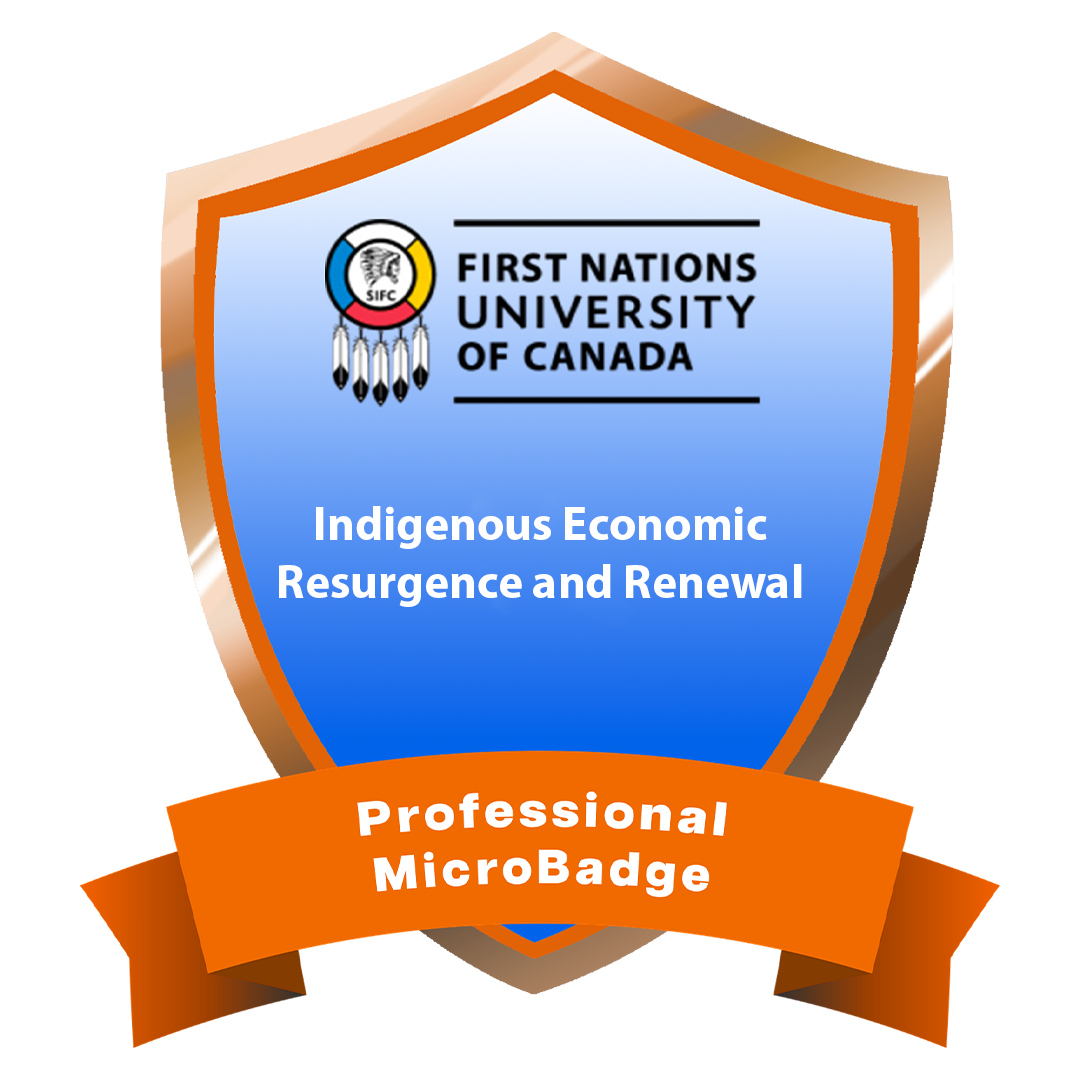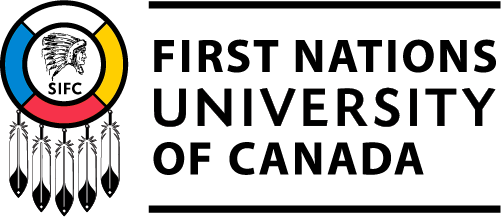ICR008 - Indigenous Economic Resurgence and Renewal
Course Description

This course invites you to explore the network of relationships that form the social, political, and legal web of Indigenous economic resurgence and renewal. The Indigenous economic businesses provided in this course will demonstrate how strong economic relationships built on respect, responsibility, and reciprocity are the path to promoting the good life, "mino pimatisiwin". Each First Nation has its own concept of or path to the good life, shaped by the relationships they have with the land, water, air, and animals. While these relationships have been suppressed through colonization, they were not erased.
Economic relationships are being awakened, "waniska", through the renewal of Indigenous economic knowledge systems. This awakening and renewal can be an encouragement to all people in Canada to awaken and renew their own ancestral and land-based knowledge and values while relating to one's established here sing the beginning of the story of humans on Turtle Island.
This course is beneficial to learners who are interested in economic reconciliation as it relates to Indigenous economic resurgence, renewal, and relationships. The course is designed to help learners gain an understanding of the related network of people, land, plants, animals, values, beliefs, and lineages of experiences that need to be connected for healthy reciprocal, and sustainable economic ecosystem.
As you work through the course, you will gain insights into legal challenges, settlements, and legislation that Indigenous people experienced as they worked to establish businesses and partnerships to create a sustainable economy and improve socio-economic outcomes. Ideally, you, as a learner, will take from the course what you need to take steps toward reconciliation in your personal and professional life.
TRC Calls to Action
 Many, if not all, of the Truth and Reconciliation Commission's Calls to Action, once addressed, will contribute to Indigenous resurgence and renewal. This course supports several TRC Calls to Action #57 and #92. Call to Action #92 encompasses a deeper understanding of Indigenous economic relations to support actions of reconciliation at both personal and professional levels.
Many, if not all, of the Truth and Reconciliation Commission's Calls to Action, once addressed, will contribute to Indigenous resurgence and renewal. This course supports several TRC Calls to Action #57 and #92. Call to Action #92 encompasses a deeper understanding of Indigenous economic relations to support actions of reconciliation at both personal and professional levels.
Professional Development and Training for Public Servants
57. We call upon federal, provincial, territorial, and municipal governments to provide education to public servants on the history of Aboriginal peoples, including the history and legacy of residential schools, the United Nations Declaration on the Rights of Indigenous Peoples, Treaties and Aboriginal rights, Indigenous law, and Aboriginal-Crown relations. This will require skills-based training in intercultural competency, conflict resolution, human rights, and anti-racism.
Business and Reconciliation #92
92. We call upon the corporate sector in Canada to adopt the United Nations Declaration on the Rights of Indigenous Peoples as a reconciliation framework and to apply its principles, norms, and standards to corporate policy and core operational activities involving Indigenous peoples and their lands and resources. This would include, but is not limited to, the following:
i. Commit to meaningful consultation, building respectful relationships, and obtaining the free, prior, and informed consent of Indigenous peoples before proceeding with economic development projects.
ii. Ensure that Aboriginal peoples have equitable access to jobs, training, and education opportunities in the corporate sector and that Aboriginal communities gain long-term sustainable benefits from economic development projects.
iii. Provide education for management and staff on the history of Aboriginal peoples, including the history and legacy of residential schools, the United Nations Declaration on the Rights of Indigenous Peoples, Treaties and Aboriginal rights, Indigenous law, and Aboriginal-Crown relations. This will require skills-based training in intercultural competency, conflict resolution, human rights, and anti-racism.
Learning Outcomes
- Explore the concept of renewed Indigenous economies.
- Explain the relationship between the Indigenous worldview and sustainability.
- Identify legal challenges led by Indigenous Peoples that positively influenced Indigenous economic resurgence and renewal.
- Understand the effect of colonial or settler laws on Indigenous economic resurgence and renewal.
- Explain inequities that limit Indigenous Peoples' ability to participate in the economy.
- Understand ideas of reconciliation for well-being, education, income, quality of life, health, and hunting for Indigenous Peoples.
Skills and Competencies
- Analytical thinking
- Cultural awareness
- Historical analysis
- Knowledge application
Summary
-
Number of hours: 5 hours total
-
 Assessment: Themes 1 to 6 include knowledge check questions that require learners to achieve a grade of 70% or higher to move on to the next section. At the end of the course, learners will need to pass the final assessment with a grade of 70% or higher to pass this course. Each quiz, including the final assessment, allows multiple attempts. As part of this course, in Theme 7: Moving Forward with Intention, learners are required to prepare an Economic Reconciliation Action Plan for personal and professional purposes. We encourage learners to commit to taking action by sharing their personal action plan with someone they trust and, second, sharing their professional action plan with their organization or business. Finally, we encourage learners to use a journal or other recording method to support their learning experience. Learners will be prompted to respond to self-reflection questions and record their responses throughout the course. Learners are not required to share their reflections. An incomplete course will count as a fail.
Assessment: Themes 1 to 6 include knowledge check questions that require learners to achieve a grade of 70% or higher to move on to the next section. At the end of the course, learners will need to pass the final assessment with a grade of 70% or higher to pass this course. Each quiz, including the final assessment, allows multiple attempts. As part of this course, in Theme 7: Moving Forward with Intention, learners are required to prepare an Economic Reconciliation Action Plan for personal and professional purposes. We encourage learners to commit to taking action by sharing their personal action plan with someone they trust and, second, sharing their professional action plan with their organization or business. Finally, we encourage learners to use a journal or other recording method to support their learning experience. Learners will be prompted to respond to self-reflection questions and record their responses throughout the course. Learners are not required to share their reflections. An incomplete course will count as a fail. -
Previous education required: None; this course does not have a required prerequisite.
-
Delivery: Online, self-paced
-
Completion timeline: You will have 180 days from the time of registration to complete the course.
FAQs
Is this course for everyone?
- Yes, this course is relevant to all people from all walks of life. The learners' life experiences will influence how they experience the course.
Some individuals and organizations may be GST-exempt.
- First Nations University of Canada is situated on the Star Blanket First Nation and is exempt from Provincial Sales Tax (PST). If you or your organization is exempt from Government Sales Tax (GST), please contact icec@fnuniv.ca to ensure that your invoice is prepared accordingly.
I need financial support. What funding options does ICEC recommend?
- Check out our Funding Opportunities here.
Who do I contact if I need help?
- Check out the ICEC Learner Support page to see if your question is answered in the FAQs. If your question remains unresolved, feel free to complete the form with your question, or you may contact icec@firstnationsuniversity.ca for assistance with any questions you may have. We are here to help! Support requests are received during regular office hours. Please expect a response within 24-48 hours.
